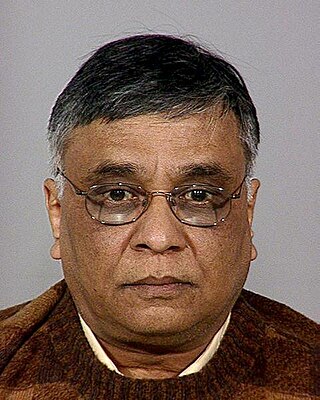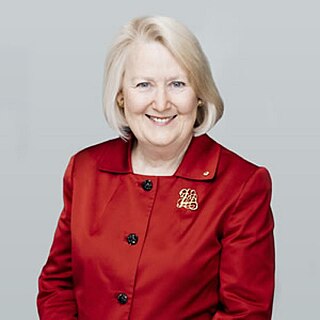Related Research Articles
Vexatious litigation is legal action which is brought solely to harass or subdue an adversary. It may take the form of a primary frivolous lawsuit or may be the repetitive, burdensome, and unwarranted filing of meritless motions in a matter which is otherwise a meritorious cause of action. Filing vexatious litigation is considered an abuse of the judicial process and may result in sanctions against the offender.
One of the six founding states of Australia, Queensland has been a federated state subject to the Australian Constitution since 1 January 1901. It is a parliamentary constitutional monarchy. The constitution of Queensland sets out the operation of the state's government. The state's constitution contains several entrenched provisions which cannot be changed in the absence of a referendum. There is also a statutory bill of rights, the Queensland Human Rights Act 2019. Queensland's system of government is influenced by the Westminster system and Australia's federal system of government.

Jayant Mukundray Patel is an Indian-born American surgeon who was accused of gross negligence whilst working at Bundaberg Base Hospital in Queensland, Australia. Deaths of some of Patel's patients led to widespread publicity in 2005. In June 2010, he was convicted of three counts of manslaughter and one case of grievous bodily harm, and sentenced to seven years' imprisonment. In August 2012, all convictions were quashed by the full bench of the High Court of Australia and a retrial was ordered due to "highly emotive and prejudicial evidence that was irrelevant to the case" laid before the jury. A retrial for one of the manslaughter counts resulted in acquittal and led to a plea deal where Patel pleaded guilty to fraud and the remaining charges were dropped. On May 15, 2015, he was barred from practising medicine in Australia.
Gordon Richard Nuttall is an Australian former politician who represented Sandgate in the Queensland Parliament from 1992 to 2006. He was a member of the Labor Party and served as a minister in the Beattie Ministry from 2001 to 2005. In 2009 he was found guilty of corruptly receiving secret commissions during his time in office and jailed for seven years. In 2010, he was found guilty of five charges of official corruption and five charges of perjury and, ultimately, jailed for an additional seven years, the longest jail term for corruption handed to a Commonwealth politician. He was released on parole in July 2015.

The Supreme Court of Queensland is the highest court in the Australian State of Queensland. It was formerly the Brisbane Supreme Court, in the colony of Queensland.
Queensland Health is the public health system in Queensland, Australia, comprising sixteen statutory Hospital and Health Services (HHS'), the Department of Health and Queensland Ambulance Service. Each HHS provides health services to its local area, with Children's Health Queensland supporting state-wide paediatric specialist services. The Department of Health provides corporate support such as payroll, finance, information technology and procurement, and provides clinical governance over the health system's operations. Queensland Health provides free or low-cost health services to Medicare card holders in Queensland, and some services to New South Wales and Northern Territory patients where services are unavailable locally.
The Queensland Public Hospitals Commission of Inquiry, often referred to as the Davies Commission, was an inquiry into public hospitals in Queensland, Australia. The inquiry was headed by The Honourable Geoffrey Davies AO QC, a former Supreme Court judge of appeal.

Bundaberg Base Hospital is the public hospital of Bundaberg, Queensland, Australia. Bundaberg Base Hospital was opened by the Governor of Queensland in 1914.
Toni Ellen Hoffman is a senior nurse who was made a Member of the Order of Australia and awarded the 2006 Australian of the Year Local Hero Award. She took on the role of whistleblower in informing Queensland Politician Rob Messenger about Jayant Patel, a surgeon who was the subject of the Morris Inquiry and later the Davies Commission. She originally began to raise doubts about the ability of Patel with hospital management and other staff. Both doctors and surgeons who were familiar with his work had also been deeply concerned.

The District Court of Queensland(QDC) is the second tier in the court hierarchy of Queensland, Australia. The Court deals with serious criminal offences such as rape, armed robbery and fraud. Juries are used to decide if defendants are guilty or not guilty.

The Queensland Court of Disputed Returns is a court that adjudicates disputes concerning Queensland Government and local government elections and state referendums in Queensland, Australia. The Court is a division of the Supreme Court of Queensland.
John Alexander Logan, SC is a judge of the Federal Court of Australia, President of the Defence Force Discipline Appeal Tribunal, a Deputy President of the Administrative Appeals Tribunal and judge of the Supreme and National Courts of Papua New Guinea.
The trial of Lex Wotton relates to the events surrounding the Townsville, Queensland proceedings in the Federal Magistrates Court concerning the actions taken by Palm Island Aboriginal Shire Council member Wotton during the 26 November 2004 Palm Island riots.
John Harris Byrne is a retired Australian jurist who previously served as Senior Judge Administrator of the Supreme Court of Queensland. Having been a judge of that court since 1989, he was one of the court's most experienced judges. He was also Chair of the National Judicial College of Australia, a body which provides programs and professional development resources to judicial officers in Australia. He is now a private Commercial Arbitrator.

Roslyn Gay Atkinson is a former Justice of the Supreme Court of Queensland, who served for 20 years from 1998 until her retirement in 2018. In 2002 she also became the Chairperson of the Queensland Law Reform Commission, and served in that role until her retirement in 2013. As well as being responsible for the Yankee Doodles precedent, Justice Atkinson has also made two notable decisions in her capacity as member of the Queensland Legal Practice Tribunal.
Jean Hazel Dalton is justice of the Supreme Court of Queensland in the Trial Division. She was appointed to the court in 2011.
Debra Mullins is the president of the Queensland Court of Appeal. She has served on the Supreme Court of Queensland since 2000, and was elevated to the Court of Appeal in 2020. She was appointed as senior counsel in and for the State of Queensland in 1998.
Timothy Francis Carmody is an Australian judge who was the Chief Justice of Queensland between 8 July 2014 and 1 July 2015. His previous roles include work as a police officer, barrister, Queensland Crime Commissioner, Family Court of Australia judge, and Chief Magistrate of the Magistrates Court of Queensland. He also presided over the 2013 Child Protection Commission of Inquiry.
Walter Sofronoff is an Australian jurist and lawyer who served as the President of the Queensland Court of Appeal from 2017 to 2022 and as the Solicitor-General of Queensland from 2005 to 2014.
References
- ↑ Henry Fryberg (23 September 1994). "Address by Justice Fryberg on the occasion of his swearing in" (PDF). Supreme Court of Queensland.
- ↑ "The Honourable Henry George Fryberg". Supreme Court of Queensland. Archived from the original on 10 March 2015.
- ↑ de Jersey, The Honourable Paul. "Speech delivered at the valedictory ceremony upon the retirement of the Honourable Justice H G Fryberg" (PDF). [2013] Queensland Judicial Scholarship 46.
- 1 2 Brisbane City Council v Mathews [2006] QSC 25 (9 February 2006), Supreme Court (Qld,Australia).
- ↑ Legal Services Commissioner (13 February 2008). "Discipline Application: Richard Francis Quinn" (PDF). Archived from the original (PDF) on 26 June 2009.
- ↑ Legal Services Commissioner v Quinn [2008] QLPT 19 (22 August 2008), Legal Practice Tribunal (Qld,Australia).
- ↑ Amelia Bentley (22 August 2008). "Surgeon's actions caused fatal catastrophic bleeding, court told". Brisbane Times. Archived from the original on 17 July 2009.
- ↑ R v Ward [2009] QSC 38 (5 March 2009), Supreme Court (Qld,Australia)
- ↑ Sean Parnell (2 July 2010). "Manslaughter charge sets precedent". The Australian.
- ↑ Brooke Baskin (11 March 2013). "Judge orders jury in Jayant Patel manslaughter trial to 'pay attention' to evidence when deciding if he is guilty or not guilty". The Courier Mail. Archived from the original on 8 March 2014.
- ↑ Brooke Baskin, Tony Keim & Josh Robertson (14 March 2013). "Jayant Patel not guilty over patient death but more charges loom". The Courier Mail . Retrieved 30 November 2013.